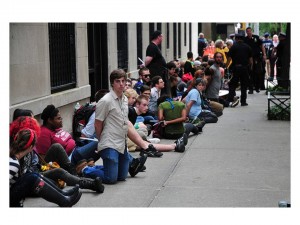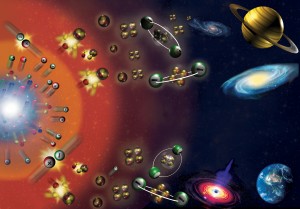Right now, if you type Wikileaks.com into your address box, you’ll be met with the word “Sorry!” followed by the words, “This sight is not currently available” with a magnifying glass hovering over the word “not” just in case you didn’t get the point. The point, of course, is “you are not going to see what is on this web site.”
When I go to what is left of Wikileaks.com, the first word that comes to my mind is censorship. But technically speaking, Wikileaks has not been censored or at least not in a manner that has a court proceeding attached to it. The United States government has publicly voiced its disapproval of the whistle-blower site; but so far, it has not directly sought to take the site down in an attempt at some kind of damage control. Not that controlling the damage was ever possible. The 90,000 documents leaked to the controversial website have already been dispersed into electronic deep space and are now secured on enough hard-drives to make their destruction a realistic solution to the State Department’s embarrassing airing of its dirty laundry no more.
Regardless, Wikileaks has been silenced. The contents of the leaked packets of information is unsettling enough and just about any media outlet with its finger anywhere near America’s pulse has jumped all over them and produced a cacophony of analyses and moral sentiments ranging from the outraged to the furious. The Wikileaks story has produced a smorgasboard of editorials and op-eds and quite frankly, I’m stuffed. But the digital counter culture has always been one of my central fixations and most of the myriad editorials and op-eds I’ve read on the issue seem to be missing the real story that’s unfolding.
The story with the real Juice in it is the manner in which Wikileaks was brought down. All the State Department had to do was make it clear that they were no friends of the Wikileaks website, and Visa, Pay-pal, and Amazon took the cue. In this way, the State Department and Senators like Joe Lieberman got what they wanted without having to use the heavy hand of censorship. But what is censorship? Usually when we think of things like censorship or “thought-crimes,” we envision them against the backdrop of a totalitarian government or fascist State. In this narrative, the government holds all the power, violence, deception, and intimidation are the means by which it maintains control. This is the frame of reference we use when we remember history’s bogey men and throw the word “Orwellian” around at cocktail parties.
However, 1984 has come and gone and the Cold War ended a long time ago. But in this age of ever merging, ever growing multi-national corporations, the government is no longer the only entity with the strength or authority to silence your freedom of speech. What makes restrictions on government censorship a good idea is pretty established. Civil rights, freedom of expression, blah, blah, blah. But what about when the power to stifle our national and global discourse lays in the hands of those who exist outside the State? Are they to be held to the same standards of transparency as the governmen or does freedom of enterprise trump freedom of speech?
In the year 2011, the ability to control information and speech extends to credit card companies, web hosting services, online retailers and digital bankers. These entities are not accountable to the public in the same way that elected officials are and when they cooperate, new forms of social control become possible. But is it saying too much to suggest that these massive corporate entities are an extension of the executive power’s ability to enforce its will? Or vice versa? Lets take a look at how governments enforced their decisions the old fashioned way.
In the old days, a government could enforce its decisions through laws and if that didn’t work it enforced them through police. Usually it didn’t have to come to that, but they were there just in case. The role of a policeman is to make sure you obey the laws, and that was okay because the laws came from people we elect who had rules of their own to follow. Furthermore, the police have rules to follow too and at the end of the day, they were just trying to keep the peace. This is why when we see things like this we’re able to dismiss the offenders as a few bad apples and maintain an uneasy respect for the men in uniform.
When leaked diplomatic cables expose the State Department of spying on the U.N. and American diplomats expressing their utter hopelessness at the prospect of a stable and self-governing Afghanistan, certain people start to look bad and the institution as a whole loses a bit of legitimacy for keeping company with so many bad apples. It then becomes clear that the people responsible for leaking those cables are more than just a nuisance. They make them look like authoritarians and plutocrats and that kind of thing has no place in a democracy. How convenient then that the half-dozen companies that made Wikileaks possible withdrew their support.
Am I saying that the State Department colluded with companies like Visa or Mastercard to shut down Wikileaks? Of course not. This isn’t Prison Planet or Fox News or some other fear vendor. What I am saying is that when so much of our access to information is controlled by an ever shrinking minority of corporate entities, their ability to censor free speech eclipses that of the government. I say eclipses and not equals because in the case of Amazon and its counterparts we are left without recourse. To attempt to force them to leave Wikileaks online would violate the freedom of enterprise and that is one freedom that you can count on to be protected at all costs.
Make no mistake. Wikileaks was policed, but it wasn’t policed by a cop or a regulator. Private enterprises did the policing and in the end the result is the same. If the goal of a business is to make money, then how did shutting down Wikileaks have affected their profit margin? Certainly not positively, with all the free publicity Wikileaks received from the New York Times, The Guardian and Der Spiegel would have probably resulted in record traffic. But to try and answer this question is to miss the point. A more interesting question is: When the power of privately-held companies to limit your freedom of speech approximates the power of your government, how free are you really?
Why Wikileaks Still Matters,




tsudo pop
21 Feb 2011If you truly take a good look at some of these media sources like NY Times, The Guardian, Washington Post, AJC, and the like, there is usually always a major cash cow funding them–mostly in the form of a privately-owned corporation that has deep ties to the government. I believe it’s all a part of Operation Mockingbird, a covert operation started back in the ’50’s by the ultimate of ultimate covert organizations: the CIA. It’s actually a interesting story that has a lot of great narratives out there. But the point is, the media and the government have been in bed together for a long time. This Wikileaks controversy is merely another peg in the cyclical interweavings of politicians intervening in the freedom of the press.
To say that any of these media associations could stand up to the government is a grave underestimation of how far deep the media’s hand is in the back pocket of some politicians. The most polarizing case it with FOX News and CNN. Wikileaks bit that hand and so they got erased. It’s not surprising, really, if you take an objective look at the history between how the media is run. The internet is and never will be free of such stifles as well, though it can sure as hell try.